
Bert W. M. Twaalfhoven (born August 13, 1928 - died 22 November 2023) was an entrepreneur and venture capitalist from Hilversum, the Netherlands.

Bert W. M. Twaalfhoven (born August 13, 1928 - died 22 November 2023) was an entrepreneur and venture capitalist from Hilversum, the Netherlands.
Twaalfhoven was born and raised in The Hague (Den Haag), the Netherlands. His teenage years were disrupted by World War II, during which his home was bombed and his mother injured. In 1947 Twaalfhoven graduated from the high school Aloysius College, in The Hague. He moved to the United States of America in the summer of 1948. Twaalfhoven received a scholarship at Fordham University in New York, and worked as a dishwasher, waiter, chauffeur and fruit-picker during the four years of his education. He was on the International Soccer team at Fordham University as well.
In 1952 Twaalfhoven graduated with a Bachelor of Science from Fordham, and was awarded a scholarship at the University of Harvard, and graduated there in 1954 with an MBA. [1]
Twaalfhoven married Maria Somary in Zurich, Switzerland in 1954. The couple moved in 1955 to Town of Mount Royal, Montreal, Canada, where their first two children were born. A third child was born in 1958 while the family was living in Long Island, NY. Five more children were born after the family moved to the Netherlands. Twaalfhoven and his wife formed the first parent-teacher organizations in North Holland. Maria Somary Twaalfhoven died on 7 February 2020 in Bilthoven, the Netherlands.
He passed away on November 22, 2023. [2]
In 1957 Twaalfhoven worked on Wall Street, New York to gain experience in the financial industry. Using money inherited by his wife, [3] he purchased a farm in Quebec with 120 cows. Twaalfhoven used the then unknown method of Artificial Insemination, and in five years raised cows that increased milk production by 100%.
Twaalfhoven's sold the farm in 1958 and moved his family to Hilversum, The Netherlands, where he started a business, setting up the first laundromats in northwestern Europe.
In 1993 Twaalfhoven received an honorary doctorate from the Fordham University for his achievements in the area of education and as an international entrepreneur.[ citation needed ] In 2001 he received the Annual Alumni Award from Harvard Business School for his activities stimulating entrepreneurship in Eastern and Western Europe. He has been a chairman of Harvard Business School Alumni. [4]
Through his company Indivers B.V., [5] [6] Twaalfhoven started 54 businesses in the countries Italy, France, Germany, Russia, Ukraine, Holland, Belgium, England, U.S.A., Singapore and China. [7] [8] Of these businesses, 17 failed. [9] Twaalfhoven was the co-founder of the first venture capital company in The Netherlands, known as Gilde. [10]
Some of the businesses Twaalfhoven founded include:
Twaalfhoven published his own book, Learn Earn Return: The Journey of a Global Entrepreneur, in April 2013 through EFER.
Twaalfhoven is a collector of 16th, 17th and 18th century maps, [11] and has donated 22 of these to Fordham University Libraries. [12] [13]
A startup or start-up is a company or project undertaken by an entrepreneur to seek, develop, and validate a scalable business model. While entrepreneurship includes all new businesses including self-employment and businesses that do not intend to go public, startups are new businesses that intend to grow large beyond the solo-founder. During the beginning, startups face high uncertainty and have high rates of failure, but a minority of them do go on to become successful and influential.
The Schwab Foundation for Social Entrepreneurship is a Swiss not-for-profit organization founded in 1998 that provides platforms at regional, national, and global levels to promote social entrepreneurship. The foundation is under the legal supervision of the Swiss Federal Government. Its headquarters are in Geneva, Switzerland. Each year, it selects 20–25 social entrepreneurs through a global "Social Entrepreneur of the Year" competition.

Social entrepreneurship is an approach by individuals, groups, start-up companies or entrepreneurs, in which they develop, fund and implement solutions to social, cultural, or environmental issues. This concept may be applied to a wide range of organizations, which vary in size, aims, and beliefs. For-profit entrepreneurs typically measure performance using business metrics like profit, revenues and increases in stock prices. Social entrepreneurs, however, are either non-profits, or they blend for-profit goals with generating a positive "return to society". Therefore, they use different metrics. Social entrepreneurship typically attempts to further broad social, cultural and environmental goals often associated with the voluntary sector in areas such as poverty alleviation, health care and community development.
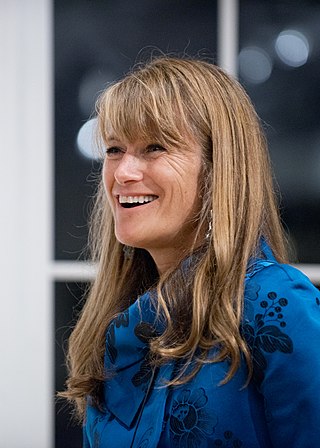
Jacqueline Novogratz is an American entrepreneur and author. She is the founder and CEO of Acumen, a nonprofit global venture capital fund whose goal is to use entrepreneurial approaches to address global poverty.
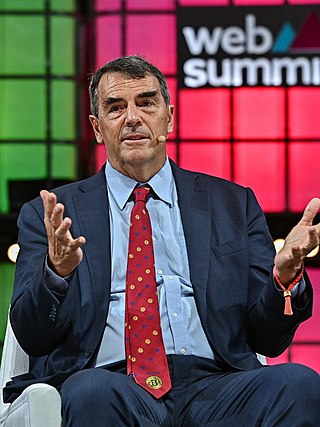
Timothy Cook Draper is an American venture capital investor, and founder of Draper Fisher Jurvetson (DFJ), Draper University, Draper Venture Network, Draper Associates and Draper Goren Holm. His most prominent investments include Baidu, Hotmail, Skype, Tesla, SpaceX, AngelList, SolarCity, Ring, Twitter, DocuSign, Coinbase, Robinhood, Ancestry.com, Twitch, Cruise Automation, PrettyLitter and Focus Media. In July 2014, Draper received wide coverage for his purchase at a US Marshals Service auction of seized bitcoins from the Silk Road website. Draper is a proponent of Bitcoin and decentralization. Draper was also one of the first investors in Theranos.
Zoltan J. Acs is an American economist. He is Professor of Management at The London School of Economics (LSE), and a professor at George Mason University, where he teaches in the Schar School of Policy and Government and is the Director of the Center for Entrepreneurship and Public Policy. He is also a visiting professor at Imperial College Business School in London and affiliated with the University of Pecs in Hungary. He is co-editor and founder of Small Business Economics.

Merlijn Twaalfhoven is a Dutch composer. He graduated from the Conservatorium van Amsterdam in 2003. Twaalfhoven is internationally active in creating innovative projects and writing new music for orchestras, choirs and chamber music groups. He collaborated with Toneelgroep Amsterdam, Holland Festival, Nederlands Philharmonisch Orkest, the Dutch National Ballet and Springdance festival, among many others. With his non profit organization La Vie Sur Terre he frequently produces large scale projects on location with local artists and musicians, for example in Cyprus, Japan, Jordan, the Palestinian Territories, Syria, and Central Europe. Twaalfhoven is a member of the Alpbach Laxenburg Group. He was a speaker about the role of arts in conflict areas at Aspen Institute Washington and Aspen Ideas Festival in Aspen, CO. In 2014 and 2015, Merlijn Twaalfhoven created "Bridging The Divide", a conversation with Tomáš Sedláček and Gloria Benedikt, linking economics and the irrational, positioning artists as agents of change. He was co-founder of Citizen Artist Incubator together with Gloria Benedikt, which was funded by Creative Europe and brought together 30 artists in two editions. The 2016 of Citizen Artist Incubator took place at IIASA. Twaalfhoven was a speaker about the role of arts in conflict areas at Aspen Institute Washington, TEDx Amsterdam, the European Forum on Culture 2013, 2016 and Aspen Ideas Festival in Aspen, Colorado, U.S.A. In 2017 he founded the Turn Club.
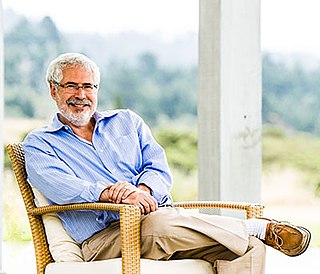
Steve Blank is an American entrepreneur, educator, author and speaker based in Pescadero, California.
An angel investor is an individual who provides capital to a business or businesses, including startups, usually in exchange for convertible debt or ownership equity. Angel investors often provide support to startups at a very early stage, once or in a consecutive manner, and when most investors are not prepared to back them. In a survey of 150 founders conducted by Wilbur Labs, about 70% of entrepreneurs will face potential business failure, and nearly 66% will face this potential failure within 25 months of launching their company. A small but increasing number of angel investors invest online through equity crowdfunding or organize themselves into angel groups or angel networks to share investment capital and provide advice to their portfolio companies. The number of angel investors has greatly increased since the mid-20th century.
Entrepreneurship is the creation or extraction of economic value in ways that generally entail beyond the minimal amount of risk, and potentially involving values besides simply economic ones.
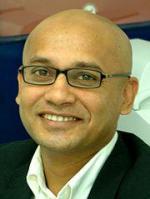
Soumodip Sarkar is an economist and management scholar.
Christopher M. Schroeder is an American entrepreneur, advisor, author, and investor in interactive technologies and social communications.
A corporate social entrepreneur (CSE) is someone who attempts to advance a social agenda in addition to a formal job role as part of a corporation. It is possible for CSEs to work in organizational contexts that are favourable to corporate social responsibility (CSR). CSEs focus on developing both social capital and economic capital, and their formal job role may not always align with corporate social responsibility. A person in a non-executive or managerial position can still be considered a CSE.

Daniel Isenberg is a Professor of Entrepreneurship Practice at Babson College Executive Education where he established the Babson Entrepreneurship Ecosystem Project (BEEP). He is the author of the book Worthless, Impossible and Stupid: How Contrarian Entrepreneurs Create and Capture Extraordinary Value. Isenberg was an entrepreneur himself for 16 years and was also a venture capitalist. He is an angel investor in several ventures.
Tarun Khanna is an Indian-born American academic, author, and an economic strategist. He is currently the Jorge Paulo Lemann professor at Harvard Business School; where he is a member of the strategy group, and the director of Harvard University’s South Asia initiative since 2010.
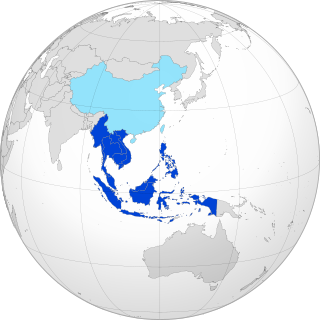
The Bamboo network or the Chinese Commonwealth is a term used to conceptualize connections between businesses operated by the Overseas Chinese community in Southeast Asia. The Overseas Chinese business networks constitute the single most dominant private business groups outside of East Asia. It links the Overseas Chinese business community of Southeast Asia, namely Malaysia, Indonesia, Singapore, Thailand, Vietnam, the Philippines, and Myanmar with the economies of Greater China. The Overseas Chinese play a pivotal role in Southeast Asia's business sector as they dominate Southeast Asia's economy today and form the economic elite across all the major Southeast Asian countries. The Chinese have been an economically powerful and prosperous minority for centuries and today exert a powerful economic influence throughout the region. Overseas Chinese wield tremendous economic clout over their indigenous Southeast Asian majority counterparts and play a critical role in maintaining the regions aggregate economic vitality and prosperity. Since the turn of the 21st century, postcolonial Southeast Asia has now become an important pillar of the Overseas Chinese economy as the bamboo network represents an important symbol of adumbrating itself as an extended international economic outpost of Greater China.

Baybars Altuntaş is a Turkish entrepreneur, angel investor, speaker and author based in Istanbul. He founded Deulcom International, a vocational training school in Turkey in 1992 and currently serves as the president of the executive committee of the company. He is currently a jury member on the new Turkish entrepreneurship program and is the current host of the Turkish version of The Weakest Link, En Zayıf Halka

Heidi Messer is an American entrepreneur and investor who has founded several global businesses, most notably LinkShare and Collective[i]. Messer served as a board member, President, and Chief Operating Officer of LinkShare, contributing to the sector of online marketing commonly referred to as affiliate marketing.
William A. Sahlman is an American academic. He is a professor emeritus at the Harvard Business School. He has published research about entrepreneurship, including over 150 business cases. He is the co-author or co-editor of three books.
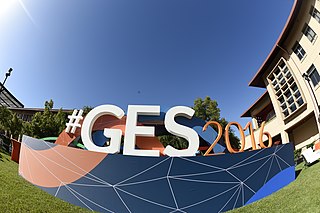
The Global Entrepreneurship Summit is an annual event organized by the federal government of the United States, in partnership with foreign government hosts. The summit originated from an event organized by the Obama Administration called the Presidential Summit on Entrepreneurship, which was held in April 2010 in Washington, D.C. It brought together entrepreneurs from the United States, Europe, Africa, the Middle East, South Asia, and Southeast Asia to discuss the importance of social and economic entrepreneurship, establish entrepreneurship as an important area of policy focus, and strengthen mutually beneficial relationships between entrepreneurs.